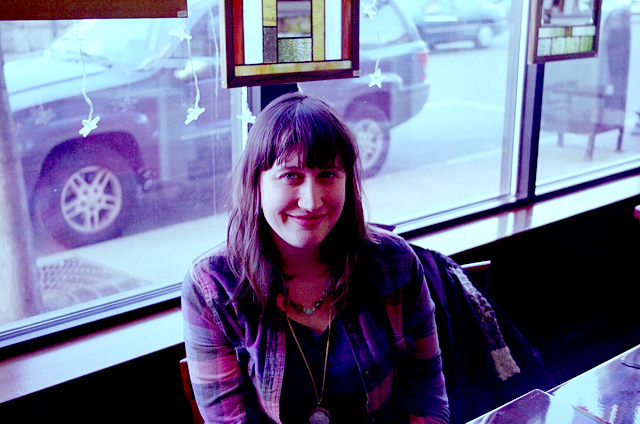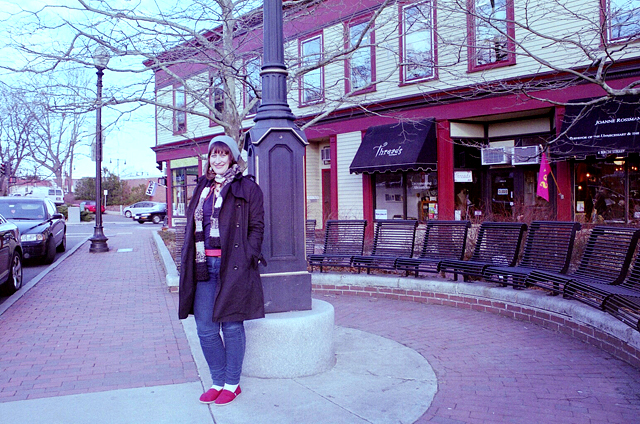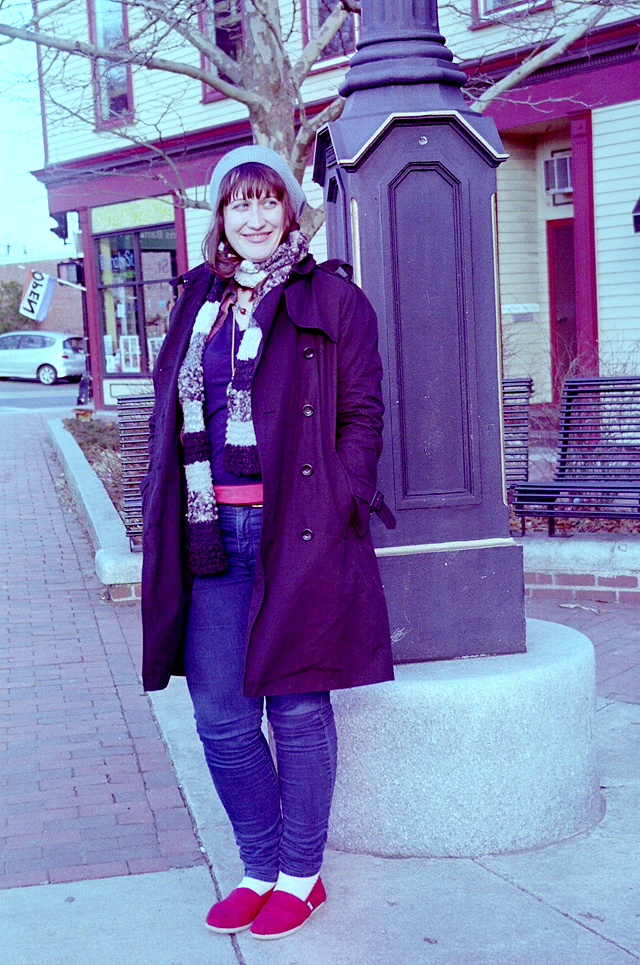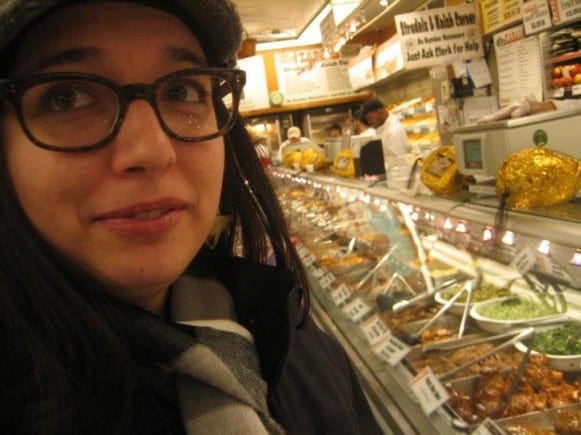National Poetry Month came and went, but during the month we sought out one of our favorite poets to ever construct a prose, Amy Lawless. Armed with her trusty voice recorder and genuine intrigue, our Editor at Large, Matia Guardabascio, met up with Lawless at Select Cafe in Roslindale where they discussed her origins, her writing process, and her new book, My Dead.

Matia A. Guardabascio/Quiet Lunch Magazine.
THE POET, THE TEACHER, THE BACKGROUND:
Matia: I saw that you teach at Rutgers. You do part-time creative writing there?
Amy: Yeah, I teach creative writing there. Sometimes I teach Expository Writing also, but right now I’m teaching creative writing.
M: How do you like it?
A: I love it. It’s great.
M: Do you like Rutgers?
A: I do… Are you familiar with it?
M: I went there.
A: Oh you did!
M: Yes, indeed!
[Laughing]
A: Yeah, I teach in Writer’s House, which is on the New Brunswick campus and it’s fun. The students are really great. They’re really smart and engaging and weird and fun to be around.
M: I took a lot of creative writing classes at Rutgers.
A: Who did you study with?
M: Susan Miller. I was part of this group of kids that basically just took her class over and over again.
A: Oh fun! That’s really great. I don’t know her personally, but I’ve heard her name a million times.
M: Oh yeah, I’m sure.
A: This is my third semester teaching creative writing and before that I was teaching expos…
M: Do you enjoy teaching? Do you like the classroom environment?
A: Oh yeah. It’s kind of like a performance in a way. I like creating the workshop environment, getting them to trust each other, so it’s kind of like their class. What they have to say I find is often just as helpful as what I would have to say. So really it a way for them to create their writer’s community.
M: Yeah, those classes are really good for helping you come out of your shell…
A: Oh yeah, absolutely. I feel like I overhear a lot of the students say… this is the only class I make friends in, the only class I’ve actually gotten to know people in. It’s really heartening because I feel like when I was in undergrad I didn’t have… I had a few classes like that and they were usually those small writing workshops.
M: You went to BU?
A: Uh huh.
M: So you stayed home for college?
A: I lived on campus, but yeah, I didn’t really feel very adventurous in terms of leaving and foraging in a new city yet, but I kind of wish I had. But I had a good time in college though.
M: What was your undergraduate experience like in terms of your creative writing?
A: I actually didn’t take any creative writing classes in college. I majored in journalism. So I still had the workshop environment, but I was a journalism major.
M: So how did you get into poetry?
A: I had always just written my poems, or written stories. I just was doing it all the time. Sometimes more heatedly, sometimes less, depending on what was going on in my life. After college I eventually got a job at BU and just started taking creative writing classes because I could get free classes. So I took a creative writing class and that helped me kind of put my portfolio together for grad school and then I went off to grad school.
M: And then you went to the New School? How was that?
A: It was wonderful. I loved the New School. It was a wonderful experience. The teachers were amazing. I worked with Paul Violi, David Lehman, Jennifer Michael Hecht. The New Schools does a really great job at forging a writer’s community. The students really get to know each other well. I still send my poems to some of those friends I made in workshops. I still count them among my greatest friends.

Matia A. Guardabascio/Quiet Lunch Magazine.
LIVING IN NEW YORK AND THE WRITING PROCESS:
M: It must have been an interesting change of pace going from Boston to New York.
A: Oh totally. I would imagine just like it would be for anybody. The first year totally sucked and then you just get used to the chaos of New York City and how to find ways to make your rent. I think it would be the same for anybody moving to a new city. It’s chaotic and you feel lost at first and eventually you’re just doing it. And this was before iPhones, so I would be staring at Google Maps on my computer and making little notes to myself for how to get places.
M: Find landmarks and whatnot…
A: Yeah and then I’d have these ridiculous notes and I’d leave my apartment hoping that I would find where I was trying to go. And, you know, I just happened to be going there for poetry, which seems so ridiculous, but yeah it was awful at first. I mean, New York can be a horrible place. I feel like every year, like three times, I threaten to leave to myself and then it sort of gives you something back that makes you want to stay.
M: Do you find that the urban environment is conducive to your writing process?
A: Well, I’ve always been a city girl, so I’ve never lived not in the city. So I can’t really say because I’ve never lived anywhere else. I mean, I’ve lived here, which is the city, but it’s also very chill, but New York is obviously much more… it seems much more intense, but once you… your block becomes your whole universe. It isn’t quite as intimidating as it might seem, but that isn’t really your question. I guess I have no insight into that because I’ve never… Amy Lawless has never lived in the country, so she doesn’t know what it would be like.
M: The reason I ask is, in your interview with Interview Magazine, you said that you’ve been watching Planet Earth a lot and that you have it on while you write, and that’s very… natural. So I find that kind of interesting, how you’re in this urban environment and you give yourself this natural surrounding as you’re writing.
A: Yeah. I love nature. I love swimming. I love water. I’m a Pisces. I love being on boats and I love landscapes and like getting into nature and going on hikes, but yeah, as an animal, I guess I like to be around other animals, who are the same animal as me, which is human, I guess, which I guess this is my zoo.
[Laughing]
A: I think it would be very interesting… I feel like lately I’ve been talking a lot lately about living in New York, but I don’t know where I would go. I feel like I would have to like… go for either a job or a love affair, neither of which are presenting themselves right now. But I think it would be interesting to… I would be very curious as to what my work would be like if I were to live on the beach somewhere. That would be really fascinating.
M: Or in a cabin in the woods somewhere?
A: Yeah, a cabin in the woods…
M: Just move to Concord…
A: Crying alone in a cabin… that sounds horrible.
M: Well Thoreau did it, so it can’t be that bad.
A: I am not the man Thoreau is, although that would be a great exercise.

Matia A. Guardabascio/Quiet Lunch Magazine.
BEING A READER AND DISCUSSING UPCOMING WORK:
M: Would you consider yourself an avid reader?
A: Yeah, totally.
M: What have you been reading late? Aside from My Dead…
A: Well I’ve been on tour. I read… the guy I went on tour with, James Gendron, wrote a really awesome called Sexual Boat (Sex Boats) and I read his book. I’m reading a Game of Thrones book right now on my Kindle. I’m reading Jackie Clark’s book, Aphoria. I just got Seth Landman’s book. But I’ve been on tour so I’ve been reading my book out loud at reading and I haven’t been reading the kinds of poems and kinds of books that I’ve been wanting. I always catch up on a lot of shit over the summer… like I’ll read a million books. But now I’m reading a Game of Thrones book, which is highly entertaining… have you read them?
M: I just started reading them because I’ve been watching the show and I am completely hooked.
A: I’m like sort of obsessed with male power structures lately and kingdoms and empires and the ego that it takes to be in power. I’m writing this other book that’s called… manuscript, it’s not a book yet… manuscript called Empire, and it’s about roman emperors and who they had sex with and how they died, which are the most interesting things about them. So I’ve been thinking a lot about the sheer pride that it takes to think that you can be in charge of something. Because I feel like, as a woman that seems like a really complicated idea… being in charge of something and thinking that you can be the one person who is in charge. It seems like it requires such a folly of ego. So anyway, that’s just some things I’m thinking about right now.
M: This manuscript, is it prose or poetry?
A: Poetry.
M: Are you a big fan of history?
A: Yes, I am a huge fan of human history.
M: What’s your favorite time period?
A: I would say that I’m totally into the Roman Empire.
M: What about it do you find so interesting?
A: I think part of what I just said and also I went to Boston Latin School, where we had to take latin, so we were always reading these works that were in latin. They’re usually about conquering and Julius Caesar doing his business in Gaul and… it’s like… here’s what I’m conquering. Here’s a list of what I’ve done, who I’ve killed, what I’ve conquered. So at an age when my mind was lighting up, these were the things that they were having us read in latin, so like I’ve always had this weird place in my mind where I didn’t really know what to do with all this information and latin. So I guess I’m kind of like going back to something. But this is my next thing.
DISCUSSING MY DEAD:
M: Indeed. So, My Dead, that just came out last month, right?
A: Yes, it’s exciting. I’m very excited about it.
M: And you’ve been on tour for how long?
A: I was on tour starting at AWP, so from March 7th, which is when I came to Boston for AWP. The last reading was last Sunday, the 23rd or 24th. And I skipped the reading in Syracuse because I had to go back to work, but I did readings in Hadley, Mass, Montreal, Philadelphia, D.C., New York, Brooklyn, Boston, Portland, Maine. So yeah, I was all over the Northeast Corridor. I’m doing a few more readings. I have one in New York… and Rutgers. Going to Denver at the end of the month. And then I’m going to North Carolina in June.
M: So, My Dead is broken into four sections and I guess you could say the general theme of the book is mourning.
A: Yeah, mourning, death, thinking about death, dying, other people dying.
M: Your poem, “Elephants in Mourning,” which is quite long… in your interview in Interview Magazine you had said that you had watched a video of elephant mourning rituals, and I’m wondering how did you adopt that into your own sense of mourning? Did you feel like you were at a funeral?
A: That’s a very interesting question. So I had been to many funerals, and in fact, I had eulogized… 3 relatives in a year and a half… and I had eulogized each of them because I’m the writer in my family and you’ll find if you’re a writer that you’re the person who gets asked to do these things, which is an honor. It honors the person who has passed and it allows you to basically… have something to do. In these days of sitting and being with family, it allows you to scooch off to your room to write for a while. And while I feel I honored my relatives and their memories in a suitable way, all the things you do, they’re distracting. You know, you go and sit for 4 hours and suddenly eating at a buffet and you’re in a church and then you’re putting on a black outfit or taking off a black outfit and managing your own behavior and noticing the behavior of others and making sure that everybody is okay. Not that I’m the maternal type. But there’s still a lot going on and there’s a lot of people suddenly in your presence. I didn’t really feel like I… I didn’t really feel a lot at that time though, not that somebody should be forced to have X, Y and Z feelings during the funeral and wake. But I just sort of did all these things and then went back to my life, which is always very busy.
So for some reason I didn’t really process these three deaths at all. And then after the last relative died, I especially didn’t. And then a year and a half later I was just sitting on my couch one Sunday afternoon and I then I saw something on Youtube or found Planet Earth on Netflix or something and I saw these videos of elephants mourning each other and it was so ritualized and the narrator was saying this is what happens and this is what they do. They feel around the trunk for diagnostic clues for how that elephant might have died or if they had known him. And then they make their elephant noises and even the children take part in this. And if you were to watch this, it’s very emotional and it mirrored something that I wanted to feel, hadn’t felt. It was a really profound feeling, and in that moment I just had to write. And I watched as many as I could find on Youtube or on Netflix. And then I wrote it all in a 24 hour period. And then I spent a year editing it, but most of it really got out in that one day.
That’s basically how it happened and I really was feeling a lot at that time. Lots of feelings. And I like to think that this piece of art that I created is how I’m honoring my relatives because I miss them and I wish they were still here and I think about them. But I was… that was my act of mourning. I don’t know why it took me so long. I have my suspicions, but I think it happened the way that it had to. There should be no time frame on when you should process these things. You have this funeral and this eulogy. But I didn’t get to sit in the audience and listen to the eulogy of my grandmother and step-grandfather and my uncle. I was the one eulogizing. I was the one doing the performance and they were listening, so they arguably got to hear something, got to hear an honor. I mean, I don’t know. That sounds narcissistic too.
M: No, not at all. There is no time frame for grief. People take the time they need. I think it’s interesting that you say you just went right back to your life in New York, which is super fast-paced, and then on a Sunday afternoon, sitting, everything is calm and quiet when it hits you… that makes total sense to me.
A: Even though it was a year and a half later?
M: Yeah, it makes total sense to me. I’ve felt that way after relatives have died… just sitting around with nothing to do and then all of a sudden your brain just fills up with thoughts of them, of anything. You could see something that reminds you of them. I have this collection of elephants because elephants with their trunks up are good luck. I’ve been collecting them since I was a kid. Now when I go back to my apartment, I’m going to look at them and think of that poem.
A: You should Youtube search elephant mourning and you’ll see that my poem is not as out of nowhere as you might think. They actually do mourn their loved ones and they have graveyards and they go visit them. And whenever they visit one… they’re just like passing through. I don’t think that they make a pilgrimage, or maybe they do, I forget, actually they probably do. But when they pass one they stop and they check it out.
M: What do you hope that people will get out of My Dead?
A: I think in general the book, or any book of poetry, my book of poetry isn’t any different from any other book of poetry in the sense that what I would like to think it does is make somebody’s world a little bit bigger. Every time I read a book of poems by a friend or a poet, it makes me think about the world in a different way and I think that’s the most I can ask of My Dead. Maybe there are certain sections of My Dead, particularly “Elephants in Mourning,” that might allow people to think about their ancestors and their lost ones. Or maybe it will just make them laugh because elephants are not human and they can’t be and they’re not supposed to be. So it might seem very silly to some people, but that reflection I believe is a rich one. The reflection of another species. It’s kind of like when you go to the zoo and you see any of these animals playing around, it makes of laugh, right? When you see these animals interacting with each other we respond to it because something in it reminds us of ourselves because we’re animals too.
M: For me I feel like somebody could use My Dead, if you’re trying to deal with death, use it as a coping mechanism.
A: Do you think?
M: I really do. People don’t really talk about this kind of stuff. Nobody wants to hear about your dying uncle or anything. Nobody wants to talk about that stuff. And having someone who is okay with being open about those kinds of emotions and putting them to words on paper and having somebody dealing with these things in a genuine… in a human way… I feel like yeah, it could be used as a coping mechanism. I think it could be used to help someone come to terms with death and dying, at least to some degree.
A: I read at a reading a few weeks ago and a girl came up to me in tears. I read the elephants poem and this girl comes up to me in tears and she was really moved by the poems in a way that I hadn’t ever anticipated for expected. They seemed to serve that purpose and it was really quite a heavy and beautiful moment because the idea of a poem impacting somebody is like… is more than… it goes beyond the whole, “I hope someone reads my book.” That it can change somebody or make them feel something that is locked up inside or just hiding behind something else… is more than one could ever want. It’s the dream.
Written by Matia A. Guardabascio.↓

Matia A. Guardabascio: (n.) editor at large; a silly, dirty old poet known for her enthusiasm, her exuberance and her contradictory opinions of mankind.
Matia Guardabascio is a proud citizen of the Commonwealth of Massachusetts and a graduate of Rutgers University with a degree in both English and French Literature. As the daughter of a musician and a school teacher, Matia grew up in a musical household with parents who made a concerted effort to instill in her the value and importance of the arts. She is a music enthusiast, an avid reader, a writer of prose and poetry, a traveler, and an enthusiastic imbiber of red wine. The piano is her favorite instrument, followed by the drums, and she loves Impressionist artwork, especially because she doesn’t need to wear her glasses to see what’s going on. That’s right, the glasses are not for show. She wears tri-focals because she reads too much, or as her good friends might say, she actually 80-years-old.

